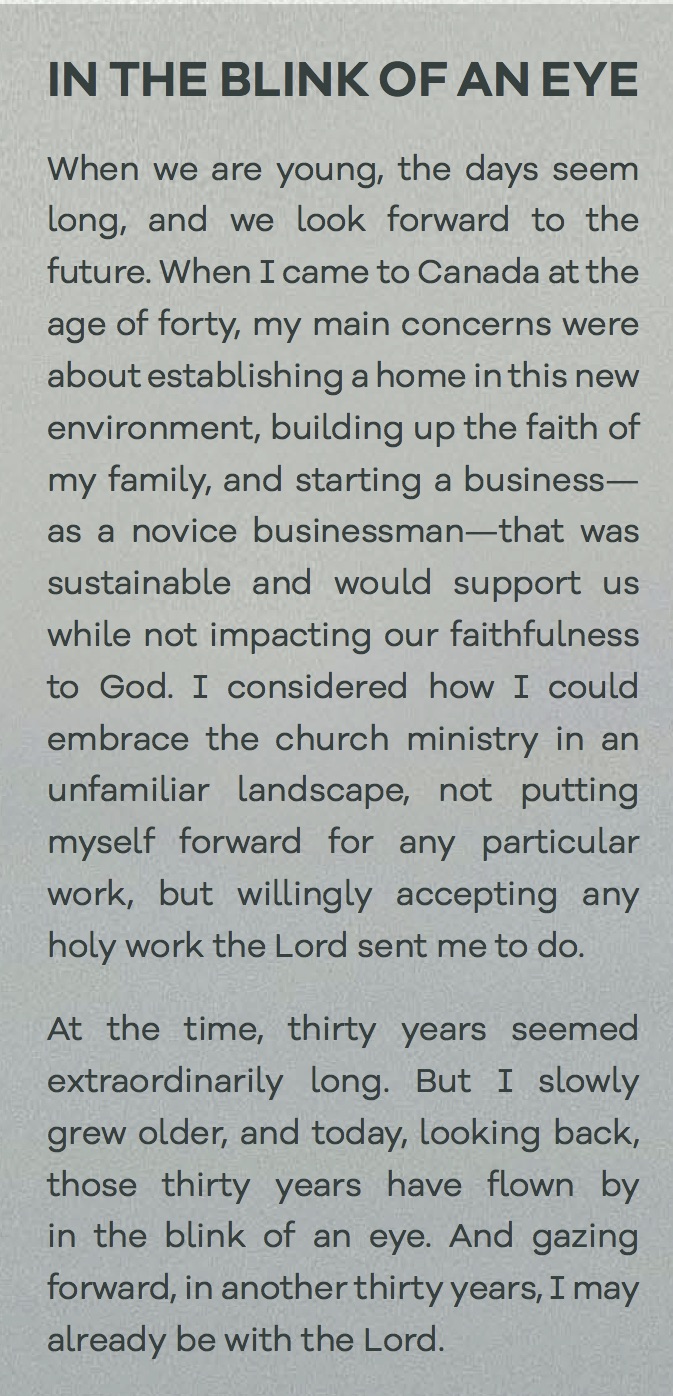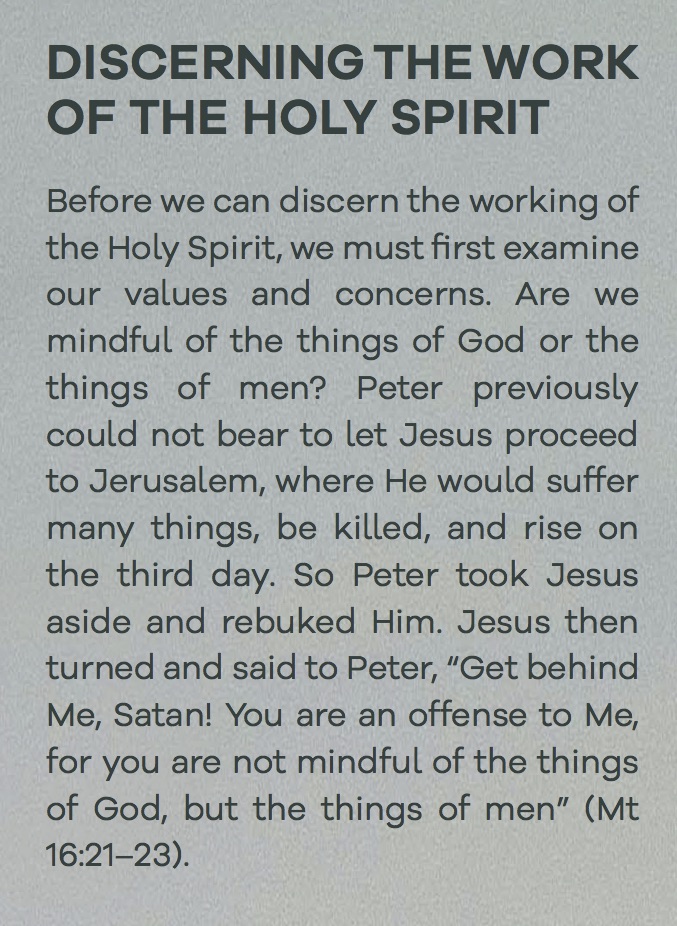KC Tsai—Toronto, Canada
[W]hereas you do not know what will happen tomorrow. For what is your life? It is even a vapor that appears for a little time and then vanishes away. Instead you ought to say, “If the Lord wills, we shall live and do this or that.” (Jas 4:14–15) These verses describe the brevity of life—it is like a vapor that exists for an instant and quickly dissipates. In the context of eternity, man only has a brief moment to grasp the opportunity to know God and have fellowship with Him. We have this limited time to understand His will for our lives and do our best to obey and walk in His will. Only then can we live a life glorifying to God and, ultimately, return to Him. Elder James adds, “If the Lord wills, we shall live and do this or that.” In all the plans a man makes, there is a fundamental presupposition: he must first be alive! And we can only live for as long as our Lord gives us life. GOD’S ROLE IN OUR PLANSWe often plan out our day down to the hour. There is nothing wrong with this. If we fail to plan, we are planning to fail. Indeed, we will likely waste a lot of time and be forced to rush at the last minute, perhaps leaving some tasks untouched or unfinished. If we have the foresight to make detailed plans, we can be prepared for every eventuality and use our time efficiently to complete our tasks. For instance, before the end of the year, the church should prepare an annual work plan for the coming year, detailing the dates of training sessions for various church workers, evangelistic events, and the pastoral workers’ schedules among the different churches. While planning is undoubtedly important, of greater importance is God’s will and whether our plans are in line with it. There are many plans in a man’s heart,
Nevertheless the LORD’s counsel—that will stand. (Prov 19:21) At the same time, circumstances may change, and our lives may pan out in such a way that we cannot execute our plans. Do not boast about tomorrow,
For you do not know what a day may bring forth. (Prov 27:1) Therefore, in our service to God, we need to pray for Him to preserve our lives. SEEK GOD WHILE WE HAVE TIMEWhen Paul was at the Areopagus in Athens, Greece, he spoke a moving sermon regarding God’s almightiness and the purpose and meaning of our human lives. He said: “And He has made from one blood every nation of men to dwell on all the face of the earth, and has determined their preappointed times and the boundaries of their dwellings, so that they should seek the Lord, in the hope that they might grope for Him and find Him, though He is not far from each one of us; for in Him we live and move and have our being, as also some of your own poets have said, ‘For we are also His offspring.’ ” (Acts 17:26–28) Everyone in this world has a preappointed time—an allotted period—in which to seek the Lord and find the path that leads to Him. We find meaning in life when we use our time on earth to know and serve God. This period of time is limited, yet many spend it in vain on secular pursuits with little or no spiritual significance. In reality, all that we do in our lives can be divided into three categories:  Essential matters: Things we must put effort into, for example, our studies, our career, raising children in the Lord, daily spiritual cultivation, and so on. These are our duties as men, which we must diligently pursue. Beneficial or bonus matters: Things worth spending time on, for example, spending quality time with our family, exercising to maintain our health, socializing with colleagues and friends with similar values, and so on. Trivial matters: Things that we should spend less time on, for example, mindlessly scrolling on our phones, playing video games, bingeing films and television shows, and so on. We ought to examine our relationship with such activities.
THE GOOD FIGHT OF FAITH The apostle Paul wrote his final letter, 2 Timothy, not long before he was martyred. He was calm and without fear in the face of death, describing his life being poured out as a drink offering on the altar, offered up amongst the other sacrifices on the burning coals (2 Tim 4:6). He goes on to write: I have fought the good fight, I have finished the race, I have kept the faith. Finally, there is laid up for me the crown of righteousness, which the Lord, the righteous Judge, will give to me on that Day, and not to me only but also to all who have loved His appearing. (2 Tim 4:7–8) This, indeed, is a beautiful song of triumph for one’s life! Like an athlete reaching the finish line, Paul seemingly breathed a sigh of relief, knowing he had given it his all. He had a clear conscience towards the visions and revelations entrusted to him by the Lord. He had done his best to finish the journey of faith the Lord had prepared for him. Though the gospel work was not going well, he knew he had played his part to his utmost ability. We yearn to one day echo Paul and heroically say, “I have fought,” “I have finished,” and “I have kept,” while envying his certainty of having a crown laid up for him. Yet we cannot help but hesitate when we think about the path he walked. How many of us would dare to traverse the same path? After all, that journey is not one that any ordinary person is ready to embark on. For the sake of preaching the gospel, Paul met with difficulties and persecution. He was struck and slandered. In the eyes of the world, if the Lord Jesus truly is almighty, then one who bears witness for Him should receive grace and blessings, not tribulation. He should receive respect rather than imprisonment. While others may have been ashamed, Paul found strength in his suffering through the power of the Holy Spirit and his deep understanding of the Lord. He knew clearly that his persecution and incarceration did not indicate his defeat or the gospel’s failure. Instead, he knew that God watches closely to see whether those who seek Him have a pure faith and a resolved heart, and whether they let the peace of Christ rule in their hearts (Col 3:15). Through trials, God allows us to learn the excellence of the knowledge of Christ Jesus, and thereby count everything else as rubbish (Phil 3:8). Paul could say that he had fought the good fight because he had done his utmost in contending for the true faith. Despite formidable difficulties and dangers, Paul relied on God to walk through them all. He had finished his race with joy, fulfilling the ministry he received from the Lord Jesus, that is, to testify to the gospel of the grace of God. “And see, now I go bound in the spirit to Jerusalem, not knowing the things that will happen to me there, except that the Holy Spirit testifies in every city, saying that chains and tribulations await me. But none of these things move me; nor do I count my life dear to myself, so that I may finish my race with joy, and the ministry which I received from the Lord Jesus, to testify to the gospel of the grace of God.” (Acts 20:22–24) Paul spoke these words to the Ephesian elders when he returned to Miletus at the end of his third missionary journey.  At every city on his journey back to Jerusalem, the Holy Spirit testified to him that chains and tribulations awaited him. Yet, Paul still pressed on, despite dissuasion from all his coworkers. Paul may not have fully understood the severity of the suffering he would face. But he overcame his fleshly weaknesses and fear. He could clearly discern what the Holy Spirit was telling him. He knew that when the Holy Spirit revealed the upcoming tribulations, it was not to stop him from going ahead. He also believed these chains and tribulations would bring unforeseen opportunities beyond his great suffering.
When Paul reached Jerusalem, the Jews from Asia saw him in the temple and stirred up the crowd, causing an uproar in the whole city. They dragged Paul out of the temple and immediately shut the doors. They sought to kill him. But he was saved by the commander of the garrison, who wanted to prevent a riot.
From then on, Paul remained in chains for a long time until he was imprisoned in Rome. On this journey, he stood before the two Roman governors and Herod Agrippa to proclaim the name of the Lord, as foretold by the Lord (Acts 9:15–16). Whenever he had the opportunity, he bore witness to the Lord. After reaching Rome, he wrote letters expounding on the truth while in prison. Indeed, Paul truly testified to the gospel of the grace of God! Hence, in his final letter, Paul could sincerely write: “I have fought the good fight, I have finished the race.” This was a good fight because it was for the true faith, and he never gave up contending. Although he endured attacks from false apostles and false brethren, Paul did his best to expound the gospel of salvation amid adversity. He gave his all to preach the gospel within the sphere God had appointed for him (2 Cor 10:13–18). Having done all this, Paul could finally proclaim, “I have kept the faith.” This is the triumphant song of his life. It is the lifelong goal for one who seeks to receive favor—to be able to say with courage and confidence at the end, “I have kept the faith; I can meet my Lord with a clear conscience.” Each of us has an individual triumphant song for our lives, which we ought to sing. In this world, we often face hardships and difficulties, whether in our daily lives or at work. At times, we may experience misunderstandings and conflicts in our relationships. Yet, in all situations, we must know the Lord in whom we have believed and faithfully do our utmost to serve Him. In this way, we can be victorious and sing our triumphant song. And joyously, the crown of righteousness laid up for Paul will also be given to us on that day, according to the Lord’s righteousness and faithfulness. | 

